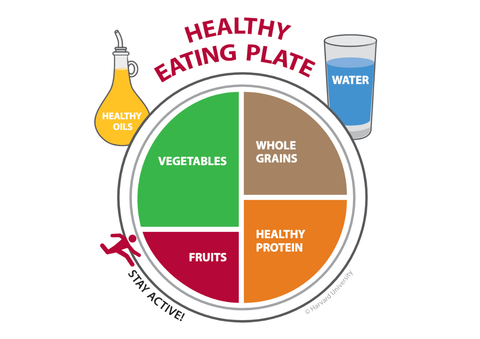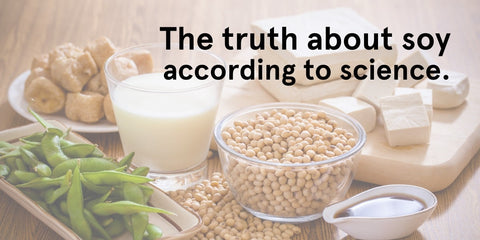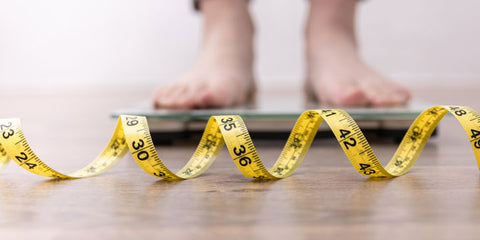The concept of balance sounds quite nice, doesn’t it?
A balanced work-life, a balanced sleep schedule, a balanced diet.
While we can’t restructure your working hours or start nagging you to get in bed at a reasonable hour, we can tell you exactly what you need to eat to maintain a balanced diet.
Consistently eating a balanced diet will create a meaningful sense of health and overall wellness in your life. Eating healthy foods specifically benefits your gut, which plays a consequential role in your happiness and mood.
Quite astoundingly, 95% of the serotonin in your body is produced and stored in your gut. Serotonin is the magic little neurotransmitter responsible for dictating your mood, wellbeing, and feelings of happiness.
By deliberately eating a balanced diet, you can keep your gut happy, keep yourself happy, and enjoy good health for years to come.
The plate metaphor
Years ago, the visual was a pyramid, today it’s a portioned plate. Stick to these portions and feel better every single day.

Harvard’s School of Public Health offers an easy-to-follow breakdown of what a balanced diet should entail. Below, we’ll guide you through food groups and portion sizes and provide you with a list of healthy foods to eat every day. First up, almighty fruits and vegetables.
The best fruits and vegetables (1/2 of your plate)

Colorful, vibrant, and rich in essential nutrients, fruits and vegetables are critical foods that should occupy a full 1/2 of each plate of food you consume. Ideally, you want to reach for a variety of fruits and vegetables, instead of leaning on a handful of favorites.
The necessity of fruit and vegetable consumption around the world is what fueled the “5 A Day” campaign, which follows The World Health Organization’s (WHO) recommendation that people should consume 5 total portions of fruits and vegetables daily.
Most of us were taught that fruits and vegetables are healthy, but what exactly makes them so good for you?
Fruits and vegetables are great sources of folate, vitamin C, potassium, fiber, and a number of other vitamins that lower your risk of serious health issues such as heart disease, stroke, and even various forms of cancer.
The best fruits and vegetables to consume are:
- Blueberries
- Bananas
- Avocados
- Tomatoes
- Cherries
- Lemons
- Broccoli
- Sweet Potatoes
- Kale
- Spinach
- Carrots
The best whole grains (1/4 of your plate)

Whole grains are far superior to refined grains.
Refined grains, such as white rice, white bread, cereals, and standard store-bought snacks, lose much of their nutrients in the refining process, leaving only one part of the grain leftover called the endosperm.
Whole grains offer a complete bundle of nutrients as they have all three parts of the grain still intact. These three parts are called the endosperm, the bran, and the germ.
The bran is the outer layer of a whole grain that is rich in fiber, B vitamins, iron, copper, zinc, and phytochemicals, which are natural compounds found in plants.
The core of the grain is referred to as the germ. The germ is where growth takes place in the grain and an array of healthy fat, Vitamin E, phytochemicals, and antioxidants live.
Lastly, the interior layer of the grain and the only part that whole and refined grains both share is called the endosperm where carbohydrates and protein are stored.
In the late 19th century, the food manufacturing industry began processing grains. By peeling away the bran and the germ, grains became softer and more digestible and had a much longer shelf life. Refined grains hold up well in fluffy bread, pastries, and countless other processed foods, but lack the nutritional content of fully intact, whole grains.
The best whole grains to consume are:
- Brown rice
- Oats
- Barley
- Corn
- Rye
- Whole-wheat bread
- Whole-wheat pasta
The best proteins (1/4 of your plate)
The final portion of your plate should consist of healthy, clean-burning (preferably plant-based) protein.
Protein is a building block of life and a critical component in your body's essential processes like building and repairing muscles, strengthening bones, boosting the immune system, diminishing food cravings, supporting heart health, and healing inflammation and injuries.
Many foods are high in protein content, but choosing the right healthy forms of protein is key to rounding out a balanced diet.
While eating moderate portions of clean meat is generally considered to be okay, getting your protein from a variety of healthy plant sources is much better. There’s a reason we chose soy as the clean-burning, powerhouse protein source that goes into every product we make.
The best, most complete sources of protein to consume are:
- Soybeans/ Edamame
- Soy Protein Isolate
- Tofu
- Eggs
- Tempeh
- Tofu
- Fish
- Chicken
- Miso
Rounding it out

If you can actively consume healthy portions of fruits and vegetables, grains, and protein, your body is going to be very happy with you.
However, you also need to be conscious of the kinds of oils your food is cooked in and the types of beverages you’re consuming throughout the day.
Avoid hydrogenated oils and instead, favor vegetable oils like olive oil, canola oil, soy oil, and peanut oil.
The Harvard School of Public Health also recommends sticking to water, coffee, and tea, drinking only small portions of juice, and forgoing sugary beverages like soda altogether.
Find balance with ease
A balanced diet first begins with a willingness to consciously eat healthier foods. To start, just add the foods we listed above to your next grocery list and toss a few new foods into your cart. A balanced grocery list leads to a balanced pantry and refrigerator which leads to regularly balanced meals.
To consume multiple healthy foods at once, search for recipes that include one or two types of vegetables, grains, and proteins in the same meal. The more variety you can include in the meals you cook, the more rich flavor and health benefits you will enjoy.
On those busier days when cooking or even pausing to eat is another daunting task in a tightly packed schedule, keep a Soylent Drink or scoop of Soylent Powder close by. Every product we make strikes a perfect balance of essential macro and micronutrients to fuel your body and mind.
Maintain a balanced diet and get closer to a balanced life.
Happy balanced eating friends!
-The Soylent Team






